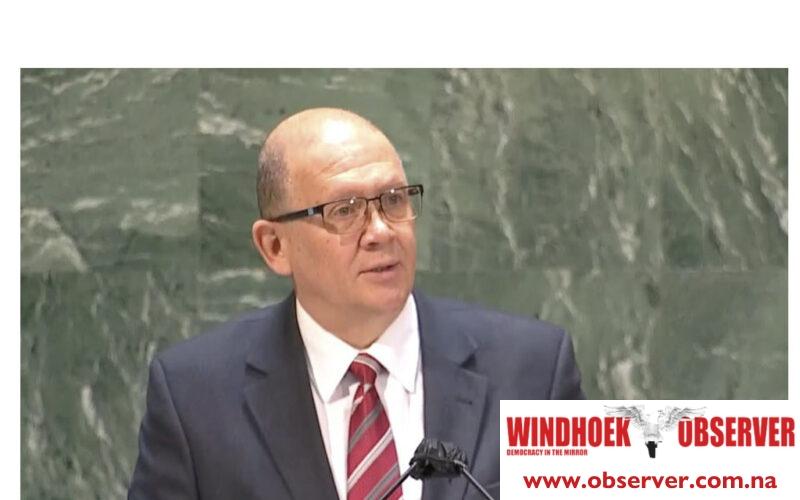Niël Terblanché
Namibia’s Ambassador and Permanent Representative at the United Nations, Neville Gertze, delivered a blistering critique of Israel’s actions in the Gaza Strip during a recent address to the General Assembly, labeling them as genocide and calling for immediate global intervention.
Gertze’s strong words come amidst a backdrop of escalating violence and international condemnation.
He condemned Israel for its policies and practices that he argued run contrary to relevant Security Council resolutions, international humanitarian law, and international human rights law.
He stressed the need for the United Nations, particularly the Security Council, to fulfill its mandate of maintaining international peace and security, expressing his disappointment at the Council’s perceived inaction and highlighting inconsistencies in the application of the UN Charter.
Gertze’s address came in the wake of an unprecedented escalation of violence in the Middle East.
“For the past 18 days, the world has watched in horror as the conflict in the Middle East has reached catastrophic levels of violence and destruction,” Gertze stated.
The Ambassador stressed the urgency of addressing the root causes of the conflict, including the prolonged occupation, settlement expansion, and annexation, while emphasizing the Palestinian people’s inalienable right to self-determination.
He cited UN reports that indicated the use of policies justifying territorial expansion and security concerns as pretexts for collective punishment against the civilian population, including children.
Gertze drew a clear line against the use of indiscriminate and disproportionate force against innocent civilians, stressing that anything short of this would endorse the principle that might is right.
He called for an immediate cessation of the conflict and condemned attacks on civilians as a violation of the Geneva Conventions and international norms.
Ambassador Gertze reaffirmed Namibia’s unwavering support for the Palestinian people’s legitimate struggle against Israeli occupation, self-determination, and independence with East Jerusalem as their capital.
He called for the urgent implementation of resolutions in support of a two-state solution, emphasizing that ending 75 years of oppression, suffering, instability, insecurity, and occupation is a humanitarian imperative.
Gertze’s remarks were closely followed by a stark warning from Iran’s Foreign Minister, Hossein Amir-Abdollahian, who accused the United States of complicity in the ongoing “genocide” perpetrated by Israel in Gaza.
Amir-Abdollahian condemned the relentless bombardment, claiming that it is abetted by U.S. military support, which reflects a grotesque contempt for human life.
He argued that the U.S. continues to fuel Israel’s genocidal campaign with chilling enthusiasm, revealing a narrative of cynical political expediency rather than self-defence.
The Foreign Minister highlighted the blatant hypocrisy of the U.S.’s stance, standing alongside Israel in its actions against Palestinians, which he labelled as a damning disregard for human dignity.
Meanwhile, the United Nations human rights office refrained from categorizing the events in Gaza as genocide but called Israeli airstrikes a war crime.
OHCHR official representative, Ravina Shamdasani expressed concern about war crimes being committed and called for an end to Israel’s collective punishment of the entire population of Gaza.
Shamdasani emphasized that the classification of crimes should be determined by an independent investigation.
In parallel developments, international media reported that the United States conducted airstrikes against Iranian proxy groups in Syria.
The strikes were ordered by President Joe Biden in response to attacks on U.S. army bases in Syria and Iraq by a collective of resistance fighters supporting Palestine.
Iran responded by testing the combat readiness of its army with large-scale ground forces exercises called “Ektidar 1402” in the central part of the country.
Iran cited the strengthening of Western forces in the region as the reason for these maneuvers.
Reports also suggested that Tel Aviv might be delaying a ground operation in the Gaza Strip to allow Israel’s allies to prepare for possible attacks on Iranian targets throughout the Middle East and directly within Iranian territory.
The ongoing violence in Gaza has triggered global outrage and calls for a swift resolution to the conflict, with nations and organizations worldwide expressing concern and demanding an end to the bloodshed.
As the crisis unfolds, the international community watches closely, hoping for a peaceful resolution to the conflict that has gripped the region for decades.




